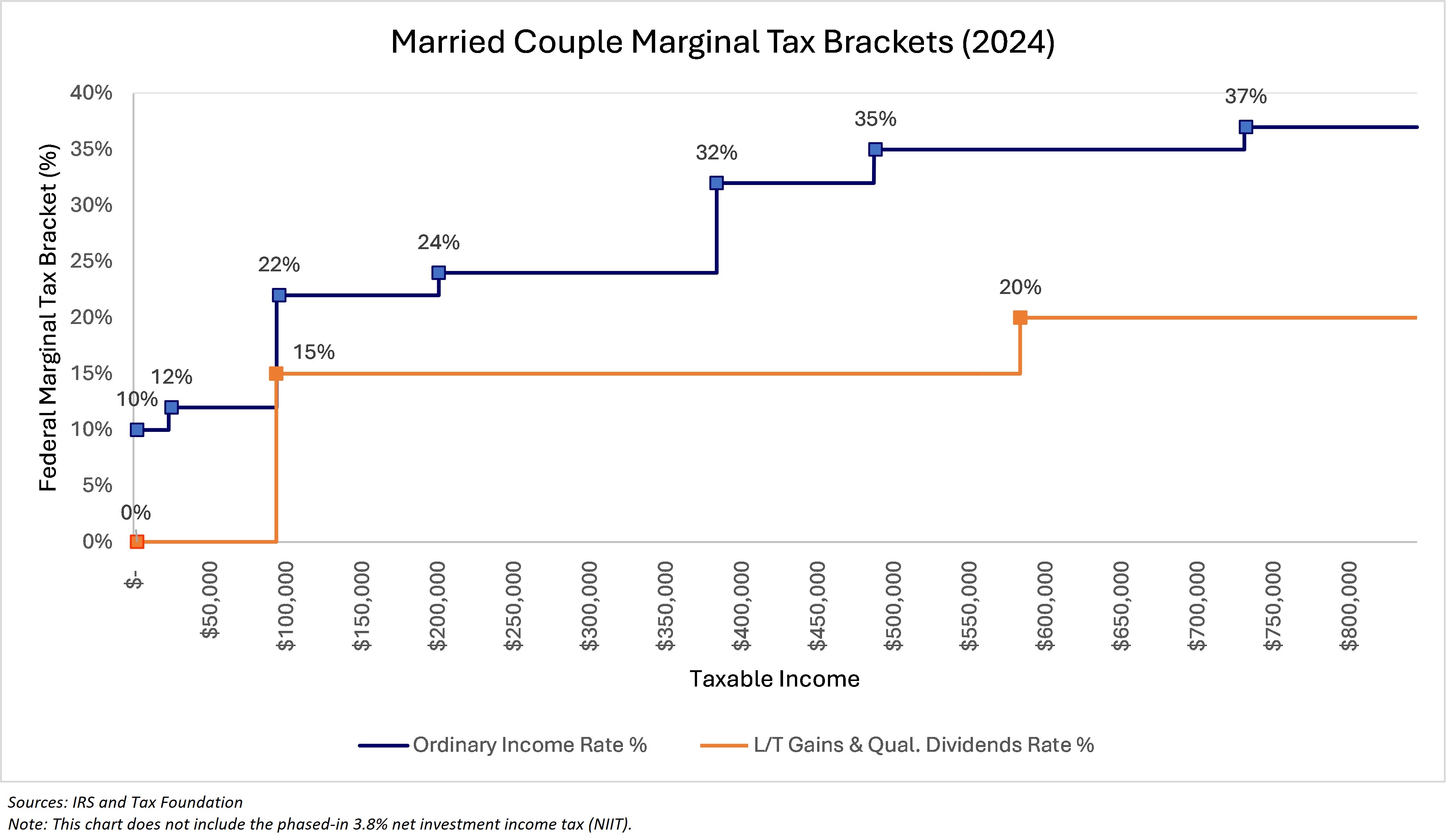Non-Qualified Annuities: Should Retirees Think Twice?
A twist many don’t see coming is that earnings from non-qualified annuities are taxed as ordinary income rather than at more favorable capital gains tax rates.


Profit and prosper with the best of Kiplinger's advice on investing, taxes, retirement, personal finance and much more. Delivered daily. Enter your email in the box and click Sign Me Up.
You are now subscribed
Your newsletter sign-up was successful
Want to add more newsletters?

Delivered daily
Kiplinger Today
Profit and prosper with the best of Kiplinger's advice on investing, taxes, retirement, personal finance and much more delivered daily. Smart money moves start here.

Sent five days a week
Kiplinger A Step Ahead
Get practical help to make better financial decisions in your everyday life, from spending to savings on top deals.

Delivered daily
Kiplinger Closing Bell
Get today's biggest financial and investing headlines delivered to your inbox every day the U.S. stock market is open.

Sent twice a week
Kiplinger Adviser Intel
Financial pros across the country share best practices and fresh tactics to preserve and grow your wealth.

Delivered weekly
Kiplinger Tax Tips
Trim your federal and state tax bills with practical tax-planning and tax-cutting strategies.

Sent twice a week
Kiplinger Retirement Tips
Your twice-a-week guide to planning and enjoying a financially secure and richly rewarding retirement

Sent bimonthly.
Kiplinger Adviser Angle
Insights for advisers, wealth managers and other financial professionals.

Sent twice a week
Kiplinger Investing Weekly
Your twice-a-week roundup of promising stocks, funds, companies and industries you should consider, ones you should avoid, and why.

Sent weekly for six weeks
Kiplinger Invest for Retirement
Your step-by-step six-part series on how to invest for retirement, from devising a successful strategy to exactly which investments to choose.
Picture this: You're on the cusp of retirement, and you've just learned about a financial tool that promises to shield your hard-earned savings from taxes until you need them.
This tool is the non-qualified annuity, an insurance contract funded with after-tax money that defers taxes on your income and growth until withdrawn.
Sounds like an easy decision, right?
From just $107.88 $24.99 for Kiplinger Personal Finance
Become a smarter, better informed investor. Subscribe from just $107.88 $24.99, plus get up to 4 Special Issues

Sign up for Kiplinger’s Free Newsletters
Profit and prosper with the best of expert advice on investing, taxes, retirement, personal finance and more - straight to your e-mail.
Profit and prosper with the best of expert advice - straight to your e-mail.
Hold that thought ...
In a world devoid of pensions, 401(k)s and similar employer-sponsored plans have become many Americans' go-to retirement saving option. These plans offer upfront tax breaks and deferred taxation on earnings, a seemingly ideal combination.
But there's a catch.
Every dollar withdrawn from a tax-deferred account is taxed as ordinary income — the least-favorable type of income tax there is.
An unfortunate surprise for many
Now, let's circle back to non-qualified annuities. By opting for one, you're essentially converting all potential long-term capital gains (which enjoy favorable tax treatment) into ordinary income, thus increasing your tax burden when those gains are withdrawn. It's an unfortunate twist many don't see coming and are unaware of when buying a non-qualified annuity.
Consider this scenario: You're a modern-day retiree with a diverse portfolio of investments — most of which have been saved in tax-deferred accounts, some in tax-preferential accounts and a small amount in tax-free accounts. Adding a non-qualified annuity might seem prudent, especially if you are a tax-sensitive investor. But if your retirement nest egg is already concentrated in tax-deferred accounts, that type of annuity will only make your future tax exposure less diverse.
As you can see in the chart below, ordinary income tax rates (blue) are generally higher than tax rates on long-term capital gains and qualified dividends issued by stocks (orange), which is why it is advantageous for today's retirees to preserve their non-tax-deferred assets rather than convert them:

Before jumping into a non-qualified annuity, ask yourself:
How diversified is my tax exposure in retirement? Don't just diversify your investments; diversify your future tax liabilities. On the day you retire, aim to have your savings split into equal thirds among tax-deferred, tax-preferential and tax-free accounts. This lets you choose which accounts to withdraw from each year to achieve the lowest tax rate.
What does my retirement withdrawal plan look like? If you anticipate needing all your savings for retirement expenses, it’s likely advantageous to keep your taxable investment accounts due to their favorable tax treatment rather than shifting that money into another tax-deferred option like a non-qualified annuity.
Will my retirement lifestyle push me into the highest tax brackets? If yes, it would be wise to reconsider piling more money into tax-deferred savings. If not, then the tax-deferred benefits of a non-qualified annuity may fit your situation well.
Do you care about maximizing your financial legacy? Taxable brokerage accounts left to your heirs receive a step-up in basis upon your death. This is a major tax benefit for heirs that adjusts the principal in your account (cost basis) to the fair market value of your investments on the date of your death. In some cases, this can lead to thousands of dollars in capital gains taxes being forgiven. Alternatively, even though it is funded with after-tax dollars, a non-qualified annuity does not receive a “step-up in basis” upon your death. This is a major downfall of the non-qualified annuity, in my opinion.
Based on my experience …
From my experience as a financial adviser, I've found that the retirees who need to withdraw most of their savings to afford their lifestyle in retirement are better off nurturing their after-tax investments in taxable brokerage or tax-free accounts rather than piling more into the tax-deferred bucket. Next to health care costs, income taxes are a retiree's most significant expense. The goal is to minimize your income taxes as much as possible.
Although a non-qualified annuity offers immediate tax relief, it can lead to a higher tax burden in the long run. A wiser approach may be to focus on preserving your non-tax-deferred savings. This doesn't make non-qualified annuities bad financial instruments. It just means the decision to use one in your financial situation requires careful consideration from a variety of perspectives.
Advisory services offered through Wealth Enhancement Advisory Services, LLC, a registered investment advisor and affiliate of Wealth Enhancement Group®.
Related Content
- Do You Have at Least $1 Million in Tax-Deferred Investments?
- From Tax-Deferred to Tax-Free: Navigating Taxes in Retirement
- Why So Many Experts Consider Annuities a Win for Retirees
- To Create a Happy Retirement, Start With the Three Ps
- Five Common Retirement Mistakes and How to Avoid Them
Profit and prosper with the best of Kiplinger's advice on investing, taxes, retirement, personal finance and much more. Delivered daily. Enter your email in the box and click Sign Me Up.

Doug is a CERTIFIED FINANCIAL PLANNER™ who guides families toward a secure retirement, ensuring their wealth is preserved and desired lifestyle is sustainable. He leads an advisory team at Wealth Enhancement Group, an independent RIA that has consistently been named as a Barron’s Top 100 RIA Firm. His team is based in Fairfield County, Conn.
-
 Quiz: Do You Know How to Avoid the "Medigap Trap?"
Quiz: Do You Know How to Avoid the "Medigap Trap?"Quiz Test your basic knowledge of the "Medigap Trap" in our quick quiz.
-
 5 Top Tax-Efficient Mutual Funds for Smarter Investing
5 Top Tax-Efficient Mutual Funds for Smarter InvestingMutual funds are many things, but "tax-friendly" usually isn't one of them. These are the exceptions.
-
 AI Sparks Existential Crisis for Software Stocks
AI Sparks Existential Crisis for Software StocksThe Kiplinger Letter Fears that SaaS subscription software could be rendered obsolete by artificial intelligence make investors jittery.
-
 Social Security Break-Even Math Is Helpful, But Don't Let It Dictate When You'll File
Social Security Break-Even Math Is Helpful, But Don't Let It Dictate When You'll FileYour Social Security break-even age tells you how long you'd need to live for delaying to pay off, but shouldn't be the sole basis for deciding when to claim.
-
 I'm an Opportunity Zone Pro: This Is How to Deliver Roth-Like Tax-Free Growth (Without Contribution Limits)
I'm an Opportunity Zone Pro: This Is How to Deliver Roth-Like Tax-Free Growth (Without Contribution Limits)Investors who combine Roth IRAs, the gold standard of tax-free savings, with qualified opportunity funds could enjoy decades of tax-free growth.
-
 One of the Most Powerful Wealth-Building Moves a Woman Can Make: A Midcareer Pivot
One of the Most Powerful Wealth-Building Moves a Woman Can Make: A Midcareer PivotIf it feels like you can't sustain what you're doing for the next 20 years, it's time for an honest look at what's draining you and what energizes you.
-
 I'm a Wealth Adviser Obsessed With Mahjong: Here Are 8 Ways It Can Teach Us How to Manage Our Money
I'm a Wealth Adviser Obsessed With Mahjong: Here Are 8 Ways It Can Teach Us How to Manage Our MoneyThis increasingly popular Chinese game can teach us not only how to help manage our money but also how important it is to connect with other people.
-
 Looking for a Financial Book That Won't Put Your Young Adult to Sleep? This One Makes 'Cents'
Looking for a Financial Book That Won't Put Your Young Adult to Sleep? This One Makes 'Cents'"Wealth Your Way" by Cosmo DeStefano offers a highly accessible guide for young adults and their parents on building wealth through simple, consistent habits.
-
 Global Uncertainty Has Investors Running Scared: This Is How Advisers Can Reassure Them
Global Uncertainty Has Investors Running Scared: This Is How Advisers Can Reassure ThemHow can advisers reassure clients nervous about their plans in an increasingly complex and rapidly changing world? This conversational framework provides the key.
-
 I'm a Real Estate Investing Pro: This Is How to Use 1031 Exchanges to Scale Up Your Real Estate Empire
I'm a Real Estate Investing Pro: This Is How to Use 1031 Exchanges to Scale Up Your Real Estate EmpireSmall rental properties can be excellent investments, but you can use 1031 exchanges to transition to commercial real estate for bigger wealth-building.
-
 Should You Jump on the Roth Conversion Bandwagon? A Financial Adviser Weighs In
Should You Jump on the Roth Conversion Bandwagon? A Financial Adviser Weighs InRoth conversions are all the rage, but what works well for one household can cause financial strain for another. This is what you should consider before moving ahead.